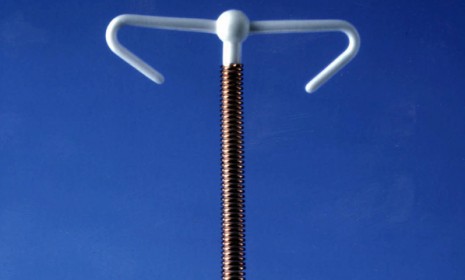Should doctors encourage sexually active teens to use IUDs?
A leading women's health group now recommends that teenage girls should consider using long-term hormone therapies in lieu of the pill or patch

A free daily email with the biggest news stories of the day – and the best features from TheWeek.com
You are now subscribed
Your newsletter sign-up was successful
A new recommendation from the American College of Obstetricians and Gynecologists (ACOG) suggests that sexually active girls should skip the pill and patch in favor of intrauterine devices and hormonal implants to avoid unwanted pregnancies. The group contends that IUDs and implants are not only safe and effective, but should now be considered "first-line recommendations." Here's what you should know:
How do the implants work?
IUDs are tiny T-shaped pieces of plastic that are inserted in the uterus. The implant secretes hormones like levonorgestrel or substances like copper to kill off incoming sperm, and can be highly effective for 5 to 10 years. Hormone implants, on the other hand, are little matchstick-sized devices that are inserted underneath the skin of the upper arm. These also help deter incoming sperm, and last about three years.
The Week
Escape your echo chamber. Get the facts behind the news, plus analysis from multiple perspectives.

Sign up for The Week's Free Newsletters
From our morning news briefing to a weekly Good News Newsletter, get the best of The Week delivered directly to your inbox.
From our morning news briefing to a weekly Good News Newsletter, get the best of The Week delivered directly to your inbox.
Why are these devices better than the pill?
They're much more reliable. Indeed, they are nearly 100 percent effective at preventing pregnancies, while the pill is sometimes only 91 percent effective, says Lindsey Tanner at the Associated Press. Yes, IUDs and implants are more invasive, and require a doctor to place them. But the pill must be taken at the same exact time every day "to be most potent." Forgetting even one can lead to an unwanted pregnancy.
Are these devices safe?
Yes, although IUDs and hormone implants have a "poor reputation to contend with," says Audrey Quinn at Smart Planet. An IUD called the Dalkon Shield that was sold in the '70s was infamously recalled after it was linked to dangerous infections. While modern implants have a very-low 0 to 2 percent infection rate, the stigma remains.
A free daily email with the biggest news stories of the day – and the best features from TheWeek.com
Should teen girls really use implants?
Well, a recent government study suggests that 43 percent of girls between ages 15 to 19 have had sex. Most of them were using some kind of birth control, but a mere 5 percent used long-lasting prevention methods. And while many teens use condoms, they frequently do so incorrectly. An implant takes out a lot of the in-the-moment guesswork. But there are also financial arguments against IUD use. The devices can cost hundreds of dollars, "compared to birth control pills which insurance companies now must cover without co-pays, or which can be found for free or low-cost through public health clinics," says Smart Planet's Quinn.
Sources: Associated Press, Smart Planet, Today Health, Web MD